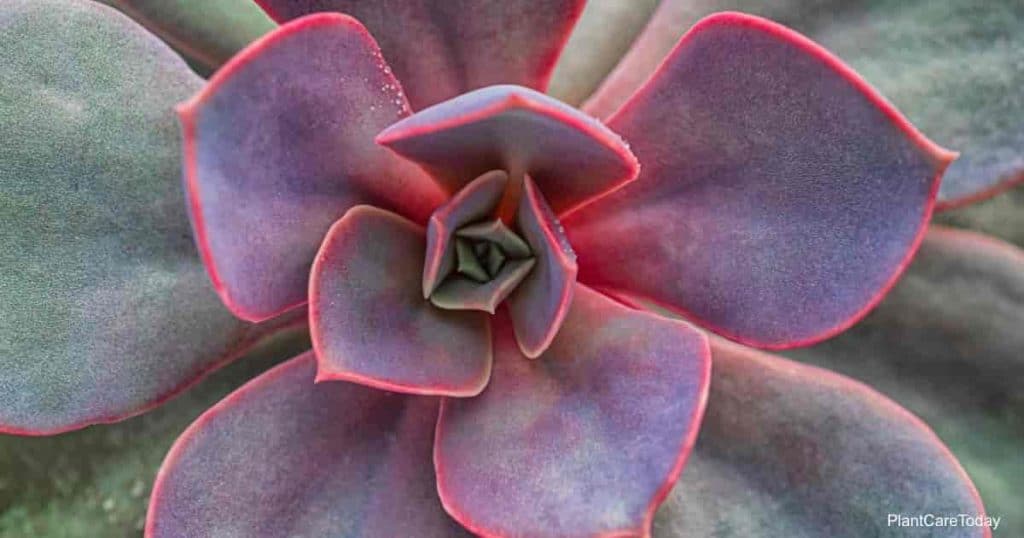Succulent plants are becoming more and more popular every day because of their easy-care personalities and their attractive appearance.
But, are succulents poisonous to dogs or dangerous for kids, pets, and livestock? In this article, we explore this question and identify several types of succulents you should keep out of the reach of pets and children.

Succulents are popular because they’re so easy to grow and propagate. They take very little care and are available in many interesting sizes, shapes, and colors.
Additionally, the flowers usually last for quite a while when they bloom.
One reason succulents are easy to care for their ability to store water inside their leaves. This not only gives them a plump and appealing appearance but also means they don’t need watering very often.
Succulents are a great choice for busy people, and they make the ideal addition as an office desk plant as they can survive on their own over the weekend and even over the holidays.
Of course, their common appearance in the household means that succulents will cross paths with pets and kids from time to time.
It’s why it is so important for parents, pet owners, pediatricians, and veterinarians to know which succulents are toxic and which are not.
Are Succulent Safe at All?
Luckily, most succulents are quite safe for pets and children.
Here’s a list of succulents you can choose from to plant in your landscape or beautify your home without fear of toxic results:
- Hen & Chickens (aka Chickens & Hens, Mother Hens, Blue Echeveria)
- Donkey Tail Succulent Care (aka: Horse’s Tail, Burro’s Tail, Lamb’s Tail)
- Painted Lady (aka Copper Rose, Maroon Plush Plant)
- Ghost Plant (aka: Mother of Pearl)
- Maroon Chenille Plant
- Mexican Firecracker
- Mexican Snowballs
- Mexican Rosettes
- Hardy Baby Tears
- Wax Rosette
- Tree Cactus
- Haworthia
This is only a partial list. Happily, the vast majority of succulents are non-toxic or perhaps mildly irritating.
Even so, there are some very toxic varieties that pet owners and parents should be aware of. Pediatricians and veterinarians should take great care to let their clients know about the danger potential inherent in these plants. Know the number for ASPCA animal poison control center – 888-426-4435.
Beware of True Aloe and Aloe Vera
Many aloe plants are very popular as houseplants, and they also do well in the landscape in warm environments.
It’s important to know that not all aloe are created equal. Some types are quite toxic to kids, pets, and livestock.
Aloe vera, a common houseplant, is one of these varieties. This plant contains saponins and anthraquinone, including vomiting, diarrhea, and lethargy if ingested. [source]
True aloe is another species of this plant that can result in dire symptoms if ingested.
True aloe contains glycosides, anthracene and anthraquinone, which may cause urine to turn red and may also cause vomiting.
Euphorbias of All Sorts Are Toxic
All succulent plants in the Euphorbia family are just full of toxic, irritating milky white sap.
One of the worst offenders is Pencil Cactus. Its sap can cause burning and stinging, and blisters on the skin.
If ingested, the sap will cause vomiting and severe irritation of the mouth, throat, and stomach.
In addition to the Pencil Cactus, other Euphorbia, such as the ubiquitous Poinsettia can cause severe problems, and indeed, Poinsettia are deadly poisonous to cats.
Contact with the milky sap of Euphorbias can also cause severe eye damage and even blindness. [source]
Kalanchoes Dangerous To Dogs and Cats
Kalanchoes (Panda plant) are attractive succulents that have lots of pretty flowers. You may also hear these plants referred to as:
- Kalanchoe Tomentosa – Panda Plant
- Mother-In-Law Plant
- Mother of Millions
- Chandelier Plant
- Devil’s Backbone
These plants are not toxic to people, but they are very toxic to cats and dogs. Ingesting any part of Kalanchoe can cause vomiting, diarrhea and may spur abnormal heart rhythm.
Jade Plants Are Toxic
Jade plant is a very common houseplant that is easy to grow and propagate. You may also hear this plant referred to as:
- Japanese Rubber Plant
- Chinese Rubber Plant
- Dwarf Rubber Plant
- Baby Jade
- Jade Tree
It is unclear exactly what component of the Jade plant is toxic to animals, but the results of ingesting it are well-documented.
Animals eating its leaves may suffer the loss of coordination, vomiting and depression.
Silver Dollar Plant Is Toxic
Silver Dollar plant (a.k.a. Chinese Jade or Silver Jade plant) is toxic to cats, dogs and livestock. It can cause a very upset stomach, vomiting and tremors. Cats who ingest this plant may appear to be drunk.
What Parts Of Succulents Are Poisonous or Toxic?
Because there are so many different types of succulents and toxicity levels vary greatly, it is not possible to say that one part or another of all succulents is toxic.
Instead, it’s best to choose non-toxic succulents and then handle all succulents as if they were toxic.
How To Protect Yourself While Handling Succulents
Always wear hand and eye protection and long sleeves when handling succulents. When you finish pruning, repotting succulents, or otherwise managing your plants, wash your hands.
Don’t burn any plant on your burn pile. You never know whether the smoke will contain irritants that could negatively impact people, domestic animals, and wildlife nearby.
Place houseplants in locations where they will be protected from meddling by pets and kids.
Provide protection for plants in the landscape so they will not inadvertently fall or be trodden upon or eaten by curious livestock.